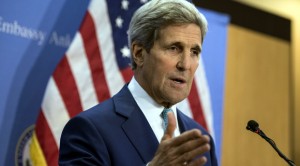Kerry praises Iran airstrikes vs ISIS
BRUSSELS, Belgium — US Secretary of State John Kerry on Wednesday welcomed any Iranian military action against Islamic State jihadists in Iraq as “positive” after the Pentagon said Tehran had carried out air strikes against the group.
Kerry, hosting a meeting of an anti-IS coalition in Brussels, said international airstrikes were finally stopping the advance of the jihadists across Iraq and Syria, but warned it could take years to finally defeat them.
But in a sign of the deepening complexity of the regional conflagration, Syria’s Iranian-backed President Bashar al-Assad criticized the Western and Arab air strikes for having no effect.
Kerry told the meeting of officials from 60 states in the coalition that a campaign of around 1,000 strikes had had a “significant” impact on the Sunni extremist IS, which declared a caliphate in Syria and Iraq in June.
“Our commitment will most likely be measured in years,” he told the meeting at NATO headquarters, adding that the partners would “engage in this campaign for as long as it takes to prevail”.
Article continues after this advertisementHe denied there was any military coordination with Iran, after the Pentagon said earlier that Iranian F-4 Phantom jets — acquired from the United States before the 1979 Islamic revolution — had deployed against IS fighters in eastern Iraq’s Diyala province.
Article continues after this advertisementBut he suggested there is an understanding between mainly Shia Iran and the United States to tackle a common threat.
“If Iran is taking on (IS) in some particular place… and it has an impact, then it’s going to be net effect (that) is positive,” Kerry told a press conference after the meeting.
In Washington, US defense officials said the Iranian air raids were part of a pattern in which Iranian or American military advisers have carved out separate spheres in Iraq.
A defense official said both Tehran and Washington want to avoid confrontations or accidents that could turn into an international crisis.
But the US-led coalition is ready to tolerate Iranian military advisers or aircraft in eastern or southern provinces with large Shiite populations.
“There’s a tacit understanding we’re not going to operate in the same space. And they’re not targeting American forces,” the official, who spoke on condition of anonymity, told AFP
Iran neither confirmed nor denied carrying out any such strikes.
‘Delegitimizing IS’
The coalition issued a statement saying that the militant group’s “advance across Syria and into Iraq is being halted”, and that Iraqi and Kurdish forces were reclaiming territory.
They also agreed to develop a “multifaceted” strategy to combat IS, including stopping the flow of foreign fighters, cutting finance and “delegitimization” of its powerful, social media-driven brand.
The United States launched its first strikes against IS in Iraq in August. In late September the strikes were extended to IS targets in Syria, involving the United States as well as a number of allies.
Saudi Arabia, the United Arab Emirates, Jordan and Bahrain are taking part in the air strikes in Syria. Australia, Belgium, Britain, Canada, Denmark, France and the Netherlands are participating in Iraq.
But Assad — whose main backers are Tehran and Moscow — hit out at the Western powers that had until months ago been focused on his removal from power amid a civil war that has killed around 200,00 people.
“You can’t end terrorism with aerial strikes. Troops on the ground that know the land and can react are essential,” he said in this week’s edition of French magazine Paris Match.
“That is why there haven’t been any tangible results in the two months of strikes led by the coalition. They would of course have helped had they been serious and efficient.”
The US has carried out the vast majority of the strikes against IS — which is estimated to number around 30,000 jihadists, and is accused of atrocities including rape, crucifixion and the beheading of Western hostages.
Shifting alliances
The Syrian conflict has created a constantly shifting patchwork of regional alliances, the most unlikely being that of Washington and Tehran.
Iranian forces have been active on the ground in Iraq assisting Shiite militia and Baghdad government units, but this was the first time the United States had said the Iranian air force was taking part.
Tehran refused to confirm or deny the air strikes against IS.
“There has been no change to Iran’s policy to provide support and advice to Iraqi officials in the fight against (IS),” foreign ministry spokeswoman Marzieh Afkham said.
The fight against the IS comes amid a US diplomatic drive to agree a deal with Iran over its nuclear programme, and officials acknowledge the two sides have discussed the war in Iraq on the margins of the nuclear talks.
RELATED STORIES
Iranian jets bomb ISIS in Iraq–US
